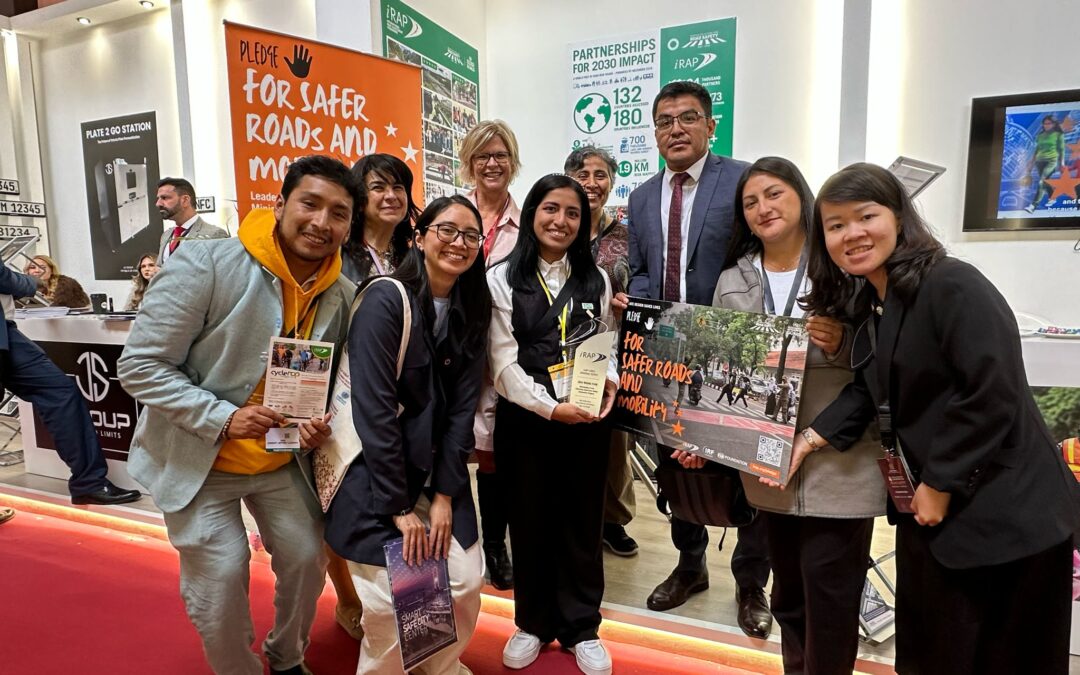What a wonderful opportunity to connect to new and old #RAPCommunity friends and colleagues at the 4th Global Ministerial Conference on #RoadSafety
Now its time to put our ideas into practice and work together so we can save lives and halve road deaths and injuries by 2030.
The Marrakech Declaration asks us all to accelerate and scale #roadsafety financing, action and reporting. iRAP is here to partner with governments, corporates and NGOs keen to eliminate high-risk roads for all road users. roadsafetymorocco.com
The Marrakech Declaration emphasizes several points related to safer road infrastructure:
Safe System Approach: The declaration advocates for a “Safe System” approach to road infrastructure, which prioritizes safety in the planning, design, construction, and maintenance phases of both urban and rural roads.
- www.safesystem.site/en/framework/moving-upward
- irap.org/2025/02/ensuring-roads-are-upgraded-and-lives-saved-the-keys-to-implementation-success/
- irap.org/star-rating-for-designs/
Speed Management: It calls for setting safe speed limits, supported by measures like redesigning road infrastructure to encourage self-enforcing speed limits.
Multi-modal Transport: The declaration promotes policies that enable multi-modal transport and active mobility, including safe pedestrian and cycling infrastructure.
International Standards: It notes the importance of aligning national road infrastructure standards with international standards.
- irap.org/policies-into-practice/
- irap.org/rap-tools/
- pledge.irap.org/
- irap.org/specifications/
- irap.org/certification/
Investment and Prioritization: The document encourages prioritizing evidence-based interventions and investments in road safety, including post-crash care and infrastructure improvements, particularly in low- and middle-income countries.
- irap.org/safety-insights-explorer/
- irap.org/rap-tools/investment-planning/safer-roads-investment-plans/
- irap.org/rap-tools/investment-planning/route-review-tool/
- toolkit.irap.org/
Local Authority Empowerment: It stresses the importance of allocating authority and resources to local authorities for implementing road safety improvements, as many decisions about urban planning and speed limits are made at the local level.
- www.elaborator-project.eu/
- www.mobiliseyourcity.net/sites/default/files/2024-10/iRAPRoadSafetyandEconomicAppraisals.pdf
- irap.org/2021/05/irap-star-ratings-of-nacto-gdcis-global-street-design-guide-now-available-in-multiple-languages/
- irap.org/2019/04/new-case-study-available-5-star-cities-for-all-road-users/
Technology and Data: The declaration discusses the need to monitor the impact of evolving technologies on road safety and to strengthen the collection of data on road safety performance indicators.
- irap.org/project/ai-rap/
- irap.org/2024/12/harnessing-360-degree-images-to-transform-school-zone-safety-in-vietnam/
- irap.org/2025/02/airap-big-data-partnerships-help-ensure-75-of-travel-is-on-3-star-or-better-roads-for-all-road-users-by-2030/
Supporting Low-Income Countries: It encourages support for low-income countries, especially in Africa, to improve their road safety indicators, including adapting road infrastructure design standards.
- irap.org/2025/02/irap-and-warso-unite-for-safer-roads-across-west-africa/
- irap.org/2025/02/irap-and-armfa-sign-mou-for-safer-african-roads/
- irap.org/2025/01/senegal-launches-the-ten-step-plan-for-safer-road-infrastructure/
- irap.org/2023/03/world-first-ten-steps-project-celebrates-success-in-tanzania/
Who is iRAP
The International Road Assessment Programme https://irap.org/ is a registered charity with established partnerships in over 130 countries. Local ownership and delivery is encouraged in every national programme with over 30,000 partners involved in the programme globally. These partners have already helped make over US$110 billion of investment safer and most importantly they have saved 700,000 people from death and serious injuries on the world’s roads by the end of 2024.
The free iRAP tools are available for the world to use thanks to the major donor support of the FIA Foundation and other partner contributions globally that are provided for the mutual benefit of all. The tools, training and support play a crucial role in improving road safety by providing a systematic way to assess and rate road infrastructure. iRAP’s methodology focuses on determining the risk of crashes for pedestrians, cyclists, motorcyclists and vehicle occupants and assigning star ratings (1 to 5 stars) to relevant road sections, with 1-star the least safe and 5-star the safest. The crash risk typically halves with each incremental improvement in star rating.
UN Member States have adopted the 3-star or better global standard as the minimum global safety standard for each road user as part of their Global Road Safety Performance Targets reinforced in the Marrakech Declaration. Investment plans also guide experts to the treatments that will maximise the lives saved for each unit of investment to ensure value for money.
Globally, achieving more than 75% of travel on 3-star or better roads for each road user will save an estimated 300 million deaths and injuries over the life of treatments, reduce global road trauma by a third and deliver over $8 of benefits for each $1 invested.
Guided by the Keys to Implementation Success, Governments, development banks, corporations and NGOs can now accelerate and scale action in support of the Marrakech Declaration building their own iRAP implementation plans including:
Setting Targets: Many countries and organizations use iRAP star ratings to set targets for improving the safety of their road network, such as increasing the percentage of roads rated 3-star or better.
Tools and Training: iRAP offers tools, training, and support to help countries build local ownership and capacity that enable organizations to assess their roads and identify areas for improvement.
Encouraging Investment: By highlighting the safety performance of roads through star ratings and the associated business case for upgrades, iRAP tools help partners prioritize investments that meet the UN Targets and maximise lives saved per unit of investment.
- irap.org/safety-insights/investing-for-impact/
- irap.org/safety-insights-explorer/
- irap.org/project/innovation-social-impact-investment/
Monitoring Progress: iRAP provides a framework for monitoring progress in improving road safety over time.
- irap.org/rap-tools/performance-tracking/performance-tracking/
- starratingforschools.org/safe-schools-tracker/
- irap.org/safety-insights-explorer/
Celebrating Success: Saving lives is special. Ribbon-cutting each and every 3-star or better road for pedestrians, cyclists, motorcyclists or vehicle occupants will create ownership of safety outcomes and build political, industry and community pride in safer roads for all road users.
Join the many iRAP partners worldwide who are supporting our vision for a world free of high-risk roads for all road users and mobilise financing, action and reporting to meet your commitments as part of the Marrakech Declaration.
For more details irap.org

















